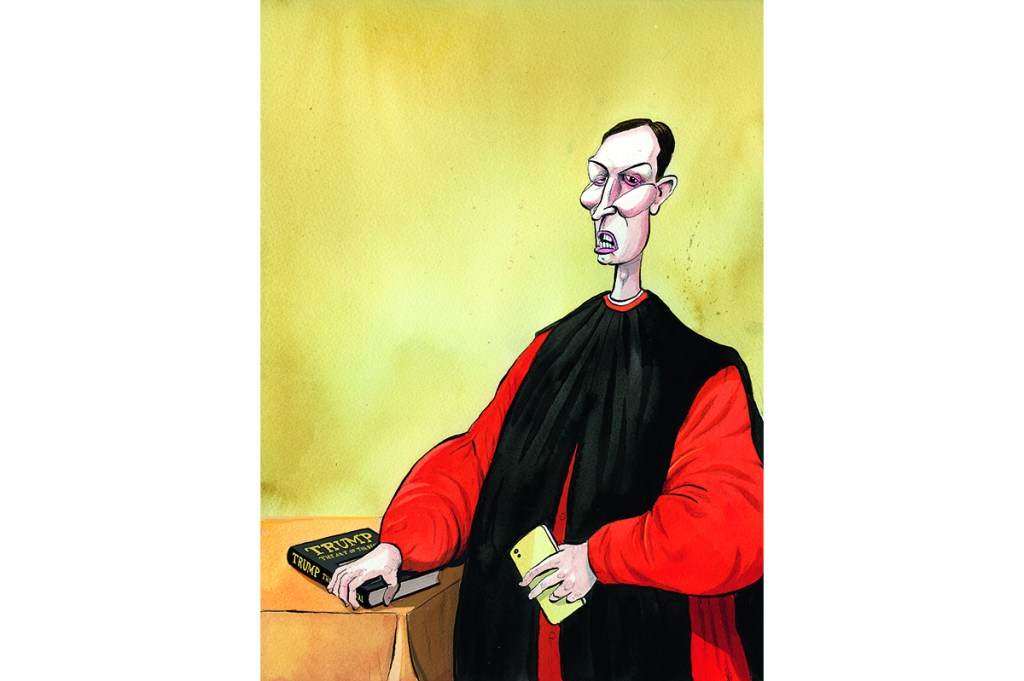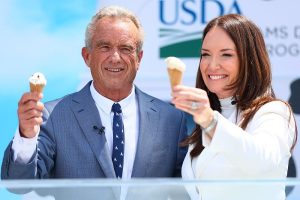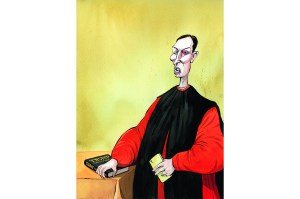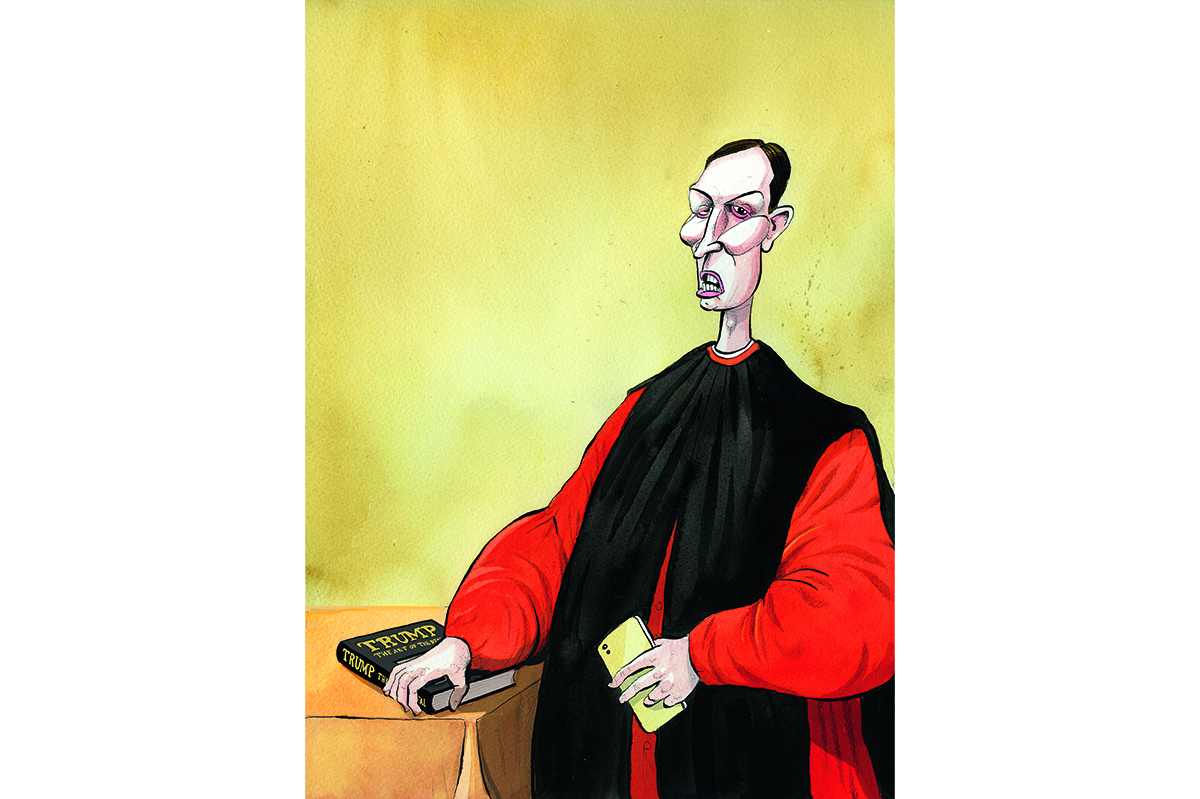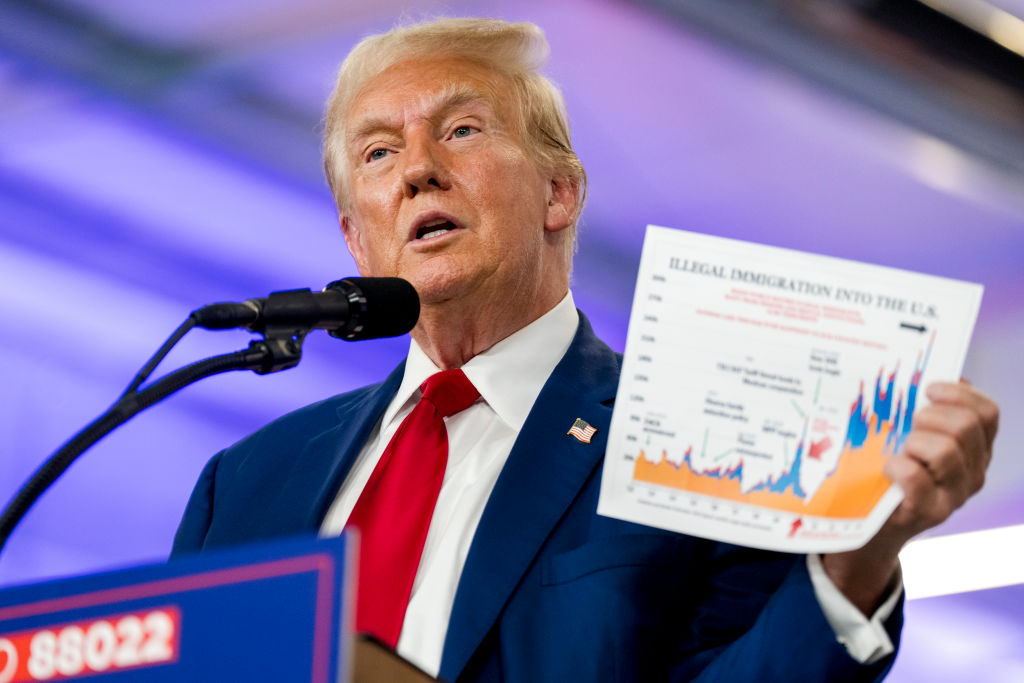After a string of broken promises, policy disappointments and sinking poll numbers, the populist wing of the Republican party knows who is to blame. It’s the President’s son-in-law, the prince of the administration, Jared Kushner.
‘Trump has a Jared problem,’ is how one conservative activist who works with the White House on immigration puts it. ‘Jared is a total fuck-up. Everything he touches turns to lead.’ Others groan about ‘four more years of Jared’ should the President be re-elected in November.
Various sources in, or connected to, the administration are stunned by the amount of power Kushner wields. He is a 39-year-old rich kid who had no experience in government before 2016, yet he is in charge of Middle East diplomacy, police reform, a major immigration reform package, criminal justice reform, PPE procurement during COVID-19 and construction of the border wall.
Kushner’s inexperience might be excusable if he were particularly brilliant. People who have sat in meetings with him, however, describe him as ‘slow’, ‘a moron’ and ‘not really that bright’. He struggles to master detail. One official suggests he doesn’t have the acuity to master one, let alone all, of the tasks the President gives him. For instance, he was in charge of producing the 600-plus-page immigration reform package, but conservatives were horrified at how little he knew about the issue he was leading on. He didn’t even seem to know what was in his own proposal; others had to step in when he was unable to answer the more technical questions.
One conservative source who attended a briefing on the plan led by Kushner told The Spectator he was shocked that Kushner seemed to have no sense of how to answer basic questions about chain migration and the diversity visa lottery. ‘He presents as someone very knowledgeable and in the know until he faces questions,’ the source said. ‘He goes off the record or on deep background so people don’t realize he’s a fucking idiot.’
Even people close to Kushner admit he is no policy expert. In his defense, they argue that his business acumen — something even his detractors recognize — is highly useful in politics. Kushner successfully tendered contracts to build the wall, putting the administration on pace to complete 450 miles by the end of the year. The administration also boasts of Kushner’s work in assembling a volunteer team of private-sector employees to procure PPE and ventilators in the fight against COVID-19. His skill in assembling a bipartisan coalition to draft and pass the First Step Act was a widely praised success — even if some hardliners saw it as a concession to Democratic thinking on criminal justice reform.
Some assign sinister motives to Kushner’s missteps. His negative influence on the administration, it’s whispered, goes beyond incompetence and veers toward deliberate sabotage. Several individuals close to the administration claim Kushner’s history as a rather progressive Democrat makes him far more ideological than he lets on, and this causes him to subvert Trump’s populist agenda. ‘The depths and lengths Jared is going to to stab Trump in the back [are] quite profound,’ one source claimed. ‘Trump’s been burned by Jared so many times,’ said another.
There are sour grapes here, no doubt. Kushner brings in advisers who are sympathetic to his political inclinations, often at the expense of conservative experts who aren’t. Some speak of Kushner’s ‘Greek chorus’: when Trump seeks out other counsel about a decision, he is often met with another Kushner lackey who parrots his son-in-law’s position. Kushner does seem to listen to different ideas, but conservative members of the administration have learned not to cross him. Nobody wants to end up like Steve Bannon, Gen. John Kelly or Kirstjen Nielsen. Kushner is family, so he can’t be fired.
Kushner’s liberal inclinations are increasingly evident in Trump’s leadership, or lack thereof. In the days after George Floyd’s death, as riots broke out in cities across the country, Trump seemed strangely muted. When a mob menaced the White House, he reportedly went into the underground bunker under the East Wing. He tweeted, of course, but he didn’t address the nation or take any bold action.
An administration official said there was an internal debate as to whether the President should deliver a national address before he had solutions to offer. According to various reports, however, Trump was slow to respond because Kushner and two of his staff picks, Brooke Rollins and Ja’Ron Smith, had argued that any harsh critique of the riots might damage the President’s bid to win more black voters. But the delay has angered supporters who want Trump to be the law-and-order president they voted for in 2016.
Why wouldn’t he speak out? It’s not as if BLM protesters and rioters would ever support him anyway, while the suburban women who feared the riots creeping into their neighborhoods, or the black community members who lost their businesses, very well might. To many inside Trumpworld, this seemed an easy win lost.
Kushner chafes at the suggestion that he is running the show or steering the President in any particular policy direction. He was quite upset when Fox News’s Tucker Carlson delivered a scathing monologue during the riots, lambasting Kushner for ‘subverting’ the President’s agenda and accusing him of ‘contempt’ for Trump’s base. A senior administration official close to Kushner suggested darkly that someone with an ‘agenda’ was getting Carlson’s ear. The official also said that Kushner is more in touch with the President’s base than those who attack him.
‘My sense is that there are people in Washington who think that they’re the President’s base who are not the President’s base,’ the official said. ‘[Trump’s] a fighter. He’s an outsider. He’s not part of the same Washington bullshit.’
‘What’s their agenda? Are they trying to give the President options or do they have a preconceived determination as to what they think the policy should be? The job is to go in there, present the President options, and then let him decide what he wants to do. He was the one who was elected…these people weren’t elected.’
Kushner’s detractors, for their part, point to some trends that should alarm the Trump 2020 campaign team. Recent polls show the President’s support waning among key groups of supporters, such as evangelical Christians, white Catholics and voters without college degrees. The sense that Trump is not, after all, on their side is growing at just the wrong moment for a re-election push.
Trump is a child of privilege but he seems to have spent enough time around working-class voters to understand what they want. His softly-spoken son-in-law lacks such empathy. He may have access to a massive data operation and be able to raise money but a certain flippancy toward those who supported Trump’s agenda from the get-go seems to inform Kushner’s policy work. Immigration hawks have found that whenever their policy ideas are stifled in the White House, Kushner emerges as the culprit. ‘I know for a fact that there was a document drafted for the President to sign saying replacing Americans with foreign workers was not in the national interest, making it explicitly illegal,’ one source close to the administration said. ‘All it would have taken is a stroke of a pen. When I would ask why it hadn’t been done, the answer was always “Jared”.’
Another source said that when conservatives in the administration were looking recently at suspending the Optional Practical Training (OPT) program, which allows foreign students to stay in the country for a specified time period after completing their degrees, Kushner ally Chris Liddell, the White House Deputy Chief of Staff for Policy Coordination, allegedly began making calls to university officials to encourage a campaign against the idea.
An administration official did not deny Kushner’s involvement and defended Liddell’s intervention. ‘The President said time and time again, he doesn’t want to shut down our universities,’ he said. ‘You know, the universities rely on [OPT]. I think a lot of these foreign students pay full price. When [officials] brief the President, we’re going to tell him where all sides are on the issue. And then he can make a decision for what he wants to do.’
[special_offer]
In April, Kushner was in the fray again when Trump was considering a blanket ban on immigration amid the coronavirus outbreak. Sources familiar with the situation told The Spectator at the time that the ban was significantly stripped back because Kushner wanted to carve out exemptions for refugees, temporary workers under the H-1B visa program and farmworkers under the H-2A visa program. White House officials rejected those claims, insisting that Kushner had been ‘supportive of the President’s policy’.
Immigration hardliners feel disillusioned. They thought that a string of tough-on-immigration policies would remind the President’s core supporters that he is still working hard on the issue and cares about American workers. A suspension of OPT and a broader temporary immigration ban were also viewed as easy political wins because of the sense of urgency created by COVID-19. Instead, activists walked away with a watered-down version of what Trump had promised on Twitter. This follows a pattern: the President addresses his supporters’ concerns on social media; his son-in-law dismisses them in government.
Kushner’s defenders point to another possibility: he has become a scapegoat for hardliners who are unwilling to blame the man in whom they have invested so much hope: President Donald J. Trump. For Trumpists, the hardest thing would be to admit that the man they elected is not their champion. It’s easier to blame Jared.



